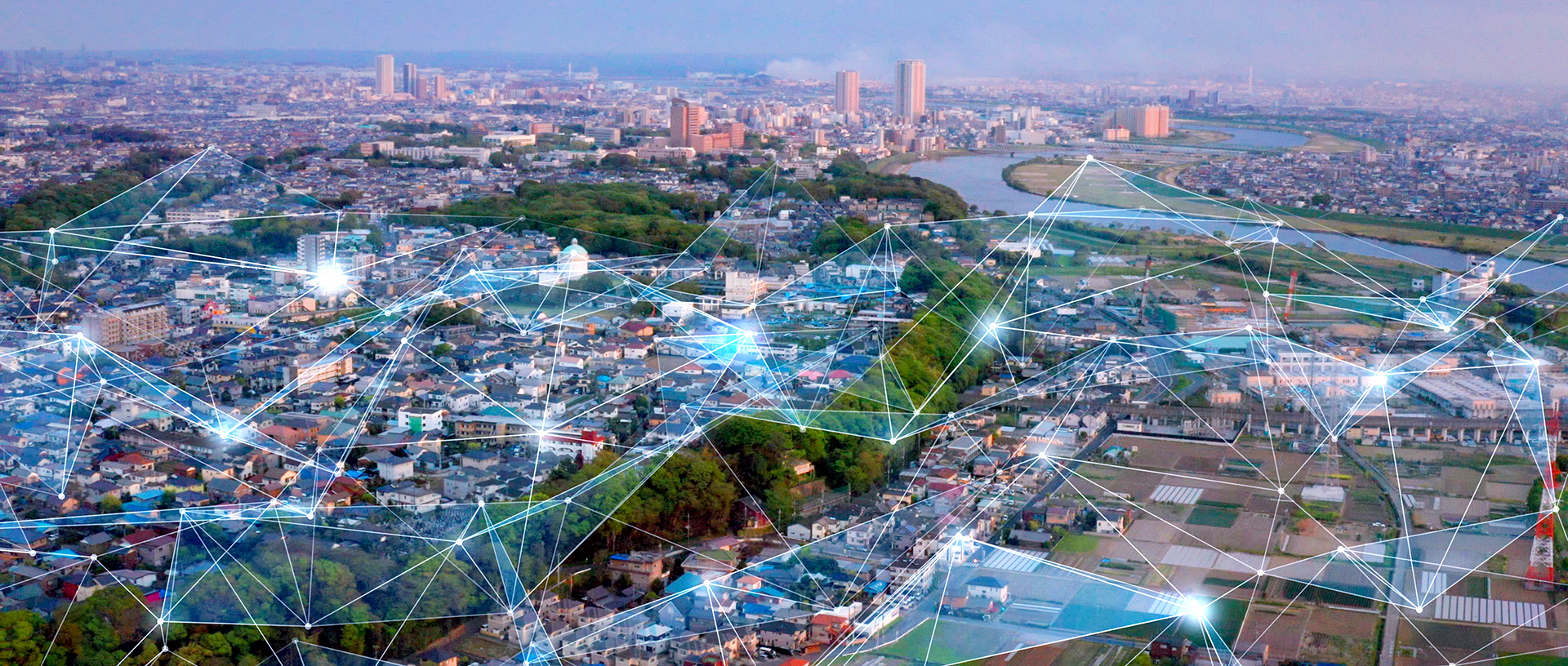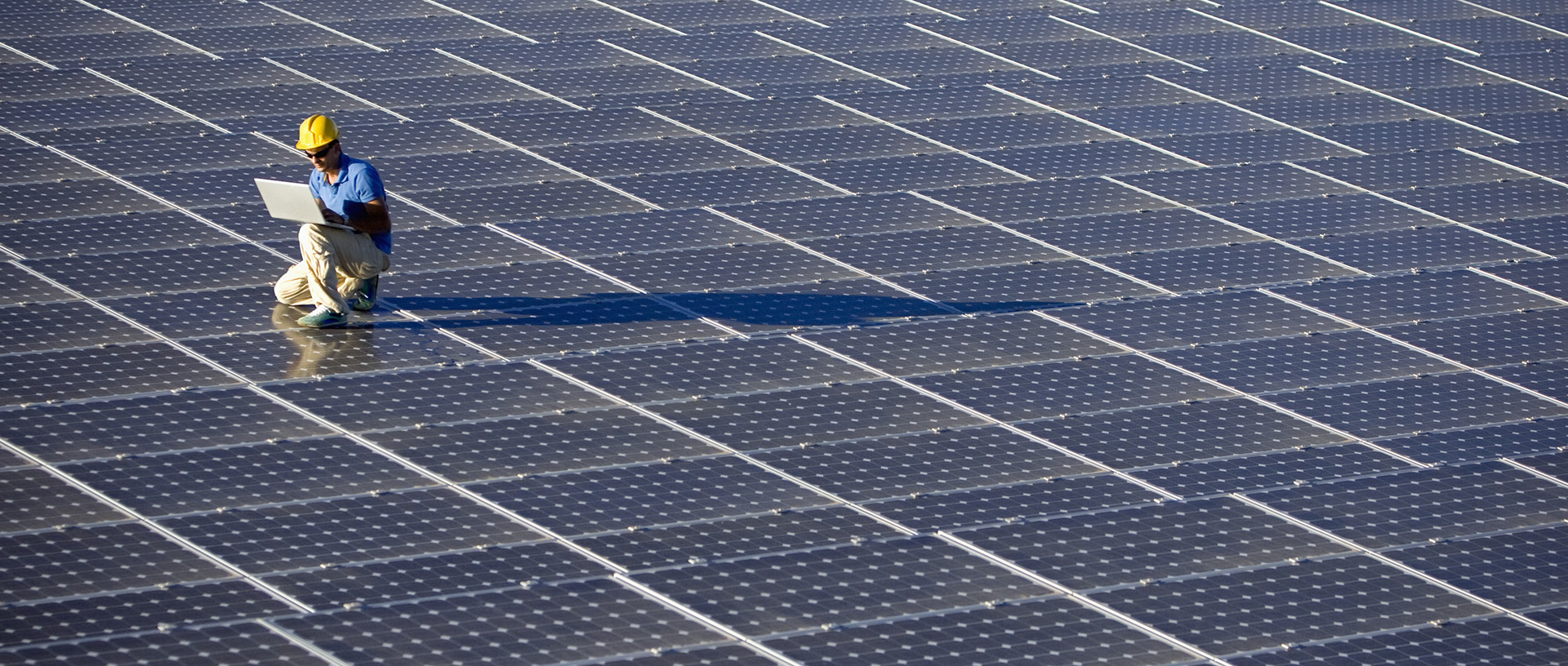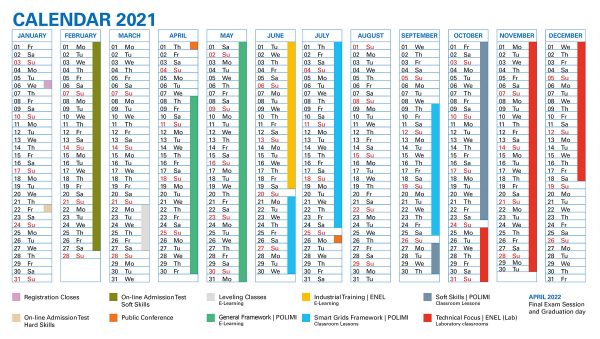ENEL vision on Smart Grids
Second level Specializing Master in SMART GRIDS presentation
MISSION
The Specializing Master is promoted and coordinated by Enel Group in collaboration with Politecnico di Milano. The final goal is to explore in depth the technical aspects of the Electric Power Systems design, operation and control, as well as their real life implementation (an essential share of the classrooms is dedicated to experimental training in advanced laboratories). The Specializing Master will investigate renewable energy, energy storage, e-mobility, big data and digitalization. The Specializing Master also aims to develop student’s soft skills, driving the students toward a 360° growth of their professional-wise attitude.
Milano @ Facilities
– Politecnico di Milano | Campus Bovisa | Via Lambruschini
Milano @ Smart Grid Labs
– Enel Group | Laboratories | Via Raffaele Rubattino
LANGUAGE
English (Classes and Labs will be held in English)
STRUCTURE
Classes will start in April 2021 over a one year program. Lectures and Labs will be held twice a week.
Module 1 | ENERGY OUTLOOK
Module 3 | HEALTH & SAFETY
Module 5 | SOFT SKILLS & INNOVATION LAB
Module 2 | SMART GRIDS
Module 4 | SMART GRIDS IMPLEMENTATION
Module 6 | PROJECT WORK
In this perspective, the Specializing Master focuses on the impact of RES on the electricity system (market & networks).
Market rules should ensure that conventional power stations are suitably operated even in the presence of large contributions from renewable generation.
Distribution networks play a key role to enable the Energy Transition, to allow the full integration of the Distributed Energy Resources (DER) and the development of new services to customers and market, moving towards a decarbonised, decentralized and sustainable energy system.
The evolution of distribution network will be addressed in the context of smart grids perspective to which distribution systems are gradually moving. For this topic, some details about technical solutions, about the use of ICT as enabling key will be given.
Finally, some case studies and real life implementations will be described, with the relevant costs and benefits.
SYLLABUS
- Energy outlook
- Industrial ecology
- Introduction to power systems & Evolution and decarbonization of power generation (including Carbon Sequestration, Cogeneration, Trigeneration and Hydrogen technology)
- National and EU energy outlooks and planning actions (Policy) – PNIEC – Long Term Strategy 2050
- Power distribution networks. Grid technical constraints. International framework, focus on the Italian power system
- Dispersed generation: impact on electrical grids of RES penetration, electrification of final energy uses and new actors
- Energy efficiency in the final uses of energy (storage, district heating, energy impact of EV recharging processes)
- Electrical network modeling – short circuit analysis
- Electricity market. Fundamentals on the international context and Focus on the Italian scenario
- Electricity market. Regulatory framework and quality of services
- Power electronics, theoretical notions, evaluation of the impact on the grid
- Electrical measurements and signal elaboration
- Power systems digitalization: IT System, Networks & Architecture (Basics, IP networks, IT system etc.); Cyber Security & Interoperability Standards (normative framework and focus on electrical sector/critical assets); Integrated Communications Protocols & Technologies
Module 2 | SMART GRIDS
- New power system actors
- Traditional and innovative network components
- Advanced management of power distribution systems: technical connection rules; DERs integration; grid protection, automation and control; power flow optimization
- Storage: technologies, services, performance, modeling
- Advanced flexibility management (EV smart EV charging, demand response, DER ancillary services)
- Quality of service: continuity, power quality and technical solutions for QoS improvement
- Smart Metering features
- Power systems resilience: impact of climate changes on network operation (case studies analysis)
- Evolution of the role of Distribution System Operators (possible regulatory and market future scenarios, TSO/DSO coordination)
- Network planning and operation: from the fit&forget approach to the flexibility management
- Smart City
Module 3 | HEALTH & SAFETY
- Introduction to Health & safety
- Management systems for the H&S
- H&S in the ENEL group
- Accident prevention: the main action tools
- Role of DSO training centers
- Accidents to third parties: a phenomenon to be countered
- Design and safety: normative references and points of attention
Module 4 | SMART GRIDS IMPLEMENTATION
- RTDS: dynamic simulation of protection and control systems (models, signals and quantities evaluation, etc.)
- Fault selection techniques (smart fault selection and further logics)
- Identification and isolation of the faulted line section
- IEC 61850 protocol
- Intelligent distributed devices for remote control,automation and MV/LV protection
- Digital (primary & secondary) substations
- Power Quality
Module 5 | SOFT SKILLS & INNOVATION LAB
- Project Management
- Negotiation, stakeholder management, communication, relationship with Public Institutions
- Leadership
- Guidance to the results
- Innovative Thinking
- Technical Visit to Microgrid Labs in Politecnico di Milano
- Drone technology for the inspection of the electrical network and power plants monitoring
- GIS tools for the planning and operation of distribution networks
- Big Data analytics and Models and systems for integrating and storing Big Data
In case of bounds correlated with local or international un-safe conditions, Module 1 to 3 could be arranged in distance learning mode.
HOW TO APPLY
Requirements
– LM17 Master of Science in Physics
– LM25 Master of Science in Automation Engineering
– LM27 Master of Science in Telecommunications Engineering
– LM28 Master of Science in Electrical Engineering
– LM29 Master of Science in Electronic Engineering
– LM30 Master of Science in Energy and Nuclear Engineering
– LM31 Master of Science in Management Engineering
– LM32 Master of Science in Computer Engineering
– LM33 Master of Science in Mechanical Engineering
– LM40 Master of Science in Mathematics
– LM82 Master of Science in Statistical Sciences
Age not exceeding 29 years and 364 days on 30/04/2021
APPRENTICESHIP
This course offers 20 positions in Enel Group for young talents who will be hired on an Apprenticeship Contract for Higher Education and Research (3rd level Apprenticeship).
Enel Group is looking for talented candidates with team working spirit, digital mindset, entrepreneurships, problem solving capacity, project management, innovative and design thinking, passioned and intellectual curiosity.
Career opportunities in Enel Group in the following areas: Network Planning and Development, Network Commercial Operations, Network Technologies and Innovation, Operation and Maintenance.
The workplace is Rome (at least 3 days per week) with courses offered in blended learning (2 days per week) in PoliMi and other Enel locations.
FEES AND REMUNERATION
Annual salary (April 2021-April 2022) of € 22.000 and enrolment fee of 10 k€ plus a 500 € tax fee fully funded by Enel Group.
ADMISSION
The deadline for the application is January 6th, 2021.
The selection of candidates is arranged in three phases:
- First, the examining committee will select a limited number of applicants after screening the CVs and the motivation letters received;
- Secondly, the chosen candidates will undergo a tehnical on-line test;
- Candidates, who will pass the second phase of selection, will have an interview with the examining committee.
DEGREE
Throughout the Academic Year students will undergo specific examinations.
Those who will suitably complete the programme of study will be awarded by the Second Level Specializing Master’s Degree of Smart Grids.
The selected talents will work in Enel Group for at least 3 days per week.
DOCUMENTATION
EXTERNAL APPLICANTS DOCUMENTATION
ENEL GROUP EMPLOYEES DOCUMENTATION
APPLY
Submit your application by January 6th, 2021
ABOUT ENEL GROUP
As Distribution System Operator, Enel is committed in providing accessible, efficient and reliable energy to over 73 million customers through 2.2 million kilometres of power lines.
Thanks to its leadership in Smart Grids, Enel is at the forefront of the energy transition: smart grids are a key lever not only to improve the quality and continuity of service, but also to enable advanced and innovative services to all market actors and to develop flexibility tools to integrate renewables, energy storage and decentralized generation.
ABOUT POLITECNICO DI MILANO
The University has always focused on the quality and innovation of its teaching and research, developing a fruitful relationship with business and productive world by means of experimental research and technological transfer.
Research has always been linked to didactics and it is a priority commitment which has allowed Politecnico Milano to achieve high quality results at an international level as to join the university to the business world.
Research constitutes a parallel path to that formed by cooperation and alliances with the industrial system.
Knowing the world in which they are going to work is a vital requirement for training students.
By referring back to the needs of the industrial world and public administration, research is facilitated in following new paths and dealing with the need for constant and rapid innovation.
The alliance with the industrial world, in many cases favored by Fondazione Politecnico and by consortiums to which Politecnico belong, allows the university to follow the vocation of the territories in which it operates and to be a stimulus for their development.








